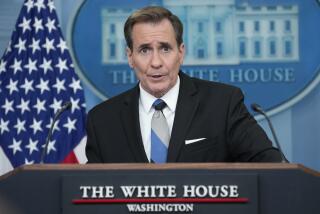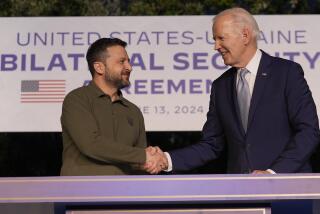U.S., Russia agree on a disposal plan for Syria’s chemical weapons
LONDON – Secretary of State John F. Kerry announced Saturday that the U.S. and Russia had agreed on a framework for impounding and destroying Syria’s stockpile of chemical weapons by the middle of next year.
Damascus will be given one week from now to give an inventory of its chemical arsenal and will have to allow international inspectors into Syria “no later than November,” Kerry said after a third day of intense negotiations with Russian Foreign Minister Sergei Lavrov in Geneva.
If Syrian President Bashar Assad fails to meet the demands, then a resolution to enforce compliance would be sought at the U.N. Security Council, Kerry said. The action could include sanctions, and Kerry said that the U.S. would reserve the right to use military force, but Russia remains opposed to any armed intervention.
“Actions will matter more than words,” Kerry warned during a news conference with Lavrov. “In the case of the Assad regime, President Reagan’s old adage about ‘trust but verify’… is in need of an update. And we have committed here to a standard here that says ‘verify and verify.’”
Though he described the plan as ambitious, Kerry added that success in disarming Syria of its chemical weapons “could conceivably be the first critical concrete step” toward a wider peace, a politically negotiated end to the civil war that has engulfed the country and left 100,000 dead.
The announcement of a deal caps a week of frenzied diplomacy sparked by a seemingly offhand comment Kerry made during a visit to London on Monday. Russia seized on his remark that Damascus could avoid U.S.-led military reprisals for its alleged use of chemical arms if it rid itself of those weapons. Moscow swiftly mounted a push to make that happen.
Western governments have expressed skepticism over whether the goal is realistic, both because of its technical complexity and the uncertain sincerity of Assad in committing to the idea.
“We said at the outset that to accomplish our goal, this plan had to produce transparency, accountability, timeliness and enforceability,” Kerry said. “It must be credible and verifiable. If fully implemented, we believe it can meet these standards.
“The world will now expect the Assad regime to live up to its public commitments,” he added. “There can be no games, no room for avoidance or anything less than full compliance by the Assad regime.”
The U.S. and Russia have agreed on an estimate of the Syrian government’s chemical weapons stockpile -- the amount and type of such arms, Kerry said. Their destruction would be expedited under the international convention banning chemical weapons, which Assad has pledged to sign.
Inspectors must be granted “an immediate and unfettered right to inspect any and all sites in Syria,” Kerry said. Lavrov added that it would be the responsibility of all actors in the Syrian conflict to guarantee and uphold the safety of the international inspectors who will descend on the country in the coming weeks.
The weapons could be taken out of Syria and destroyed elsewhere.
Kerry sought to downplay the perception that his remark in London that set the new diplomatic drive in motion was casual and impromptu. In those comments, he said the Syrian government could avoid a military strike by turning over its entire chemical arsenal and at the same time insisted Assad would never agree to such a thing.
“I purposefully made the statements that I made in London, and I did indeed say it was impossible and he won’t do it, even as I hoped it would be possible and wanted him to do it,” Kerry said. “The language of diplomacy sometimes requires that you put things to the test, and we did.”
After those comments, “I got a phone call very quickly from Sergei saying, ‘Let’s see if we can take this and move’” on it, Kerry said. “I’m pleased that [Russian] President [Vladimir] Putin took initiative and Sergei took initiative, and President Obama responded.”
Lavrov said that the agreement struck Saturday was the result of compromise and professionalism from both the American and Russian negotiators.
ALSO:
Riot police in Mexico clear teachers from historic Zocalo square
Philippine Muslim rebels agree to cease-fire, still hold hostages
U.N. report likely to show chemical weapons use in Syria, Ban says
Twitter: @HenryHChu
More to Read
Sign up for Essential California
The most important California stories and recommendations in your inbox every morning.
You may occasionally receive promotional content from the Los Angeles Times.











